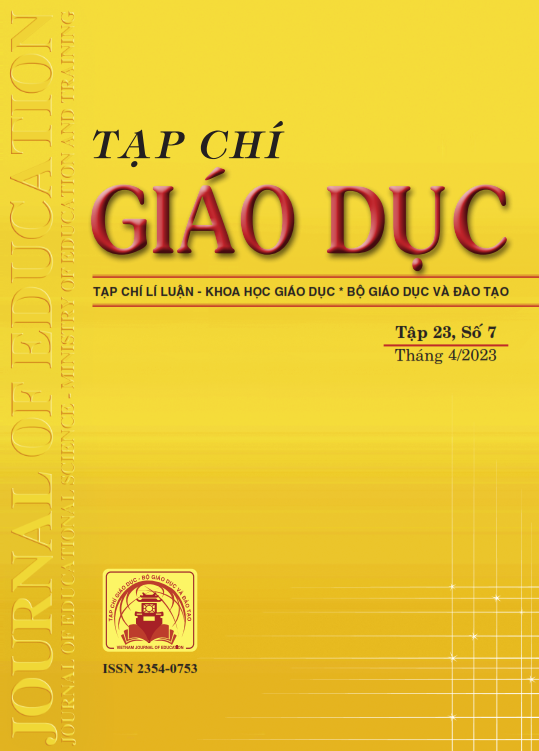Giải pháp nâng cao hiệu quả giáo dục năng lực cảm xúc - xã hội (SEL) cho học sinh tiểu học
Tóm tắt
For primary school students, the formation of a good character would become a solid foundation, helping learners to have the appropriate viewpoint, be able to acquire knowledge and thrive to fulfill social requirements. In the context of international integration, schools become more multicultural and multilingual; therefore, teachers not only provide students with theoretical knowledge but also life skills education. Social-emotional learning (SEL) is an important approach that contributes to developing learners’ personality. This article proposes three measures to apply the socio-emotional learning approach to effectively create safe education, encourage students to engage in learning and positive behavior in life. This is a useful reference for primary schools as well as teachers in exploiting different methods to improve the effectiveness of social-emotional literacy for primary school students.
Tài liệu tham khảo
Bộ GD-ĐT (2018). Chương trình Giáo dục phổ thông hoạt động trải nghiệm và hoạt động trải nghiệm, hướng nghiệp (ban hành kèm theo Thông tư số 32/2018/TT-BGDĐT ngày 26/12/2018 của Bộ trưởng Bộ GD-ĐT).
CASEL (2018). Illinois Social and Emotional Learning Standards. Truy cập tại https://www.casel.org/wp-content/uploads/2016/08/PDF-7-IllinoisSEL-Standards.pdf
Đào Thị Linh Giang (2021). Giáo dục năng lực cảm xúc, xã hội cho sinh viên Khoa Giáo dục mầm non - Trường Đại học Sư phạm, Đại học Đà Nẵng theo mô hình SEL quốc tế. Tạp chí Thiết bị giáo dục, 245, 45-51.
Dương Giáng Thiên Hương (2017). Hoạt động trải nghiệm sáng tạo - lí thuyết và vận dụng trong dạy học tiểu học. Tạp chí Khoa học, Trường Đại học Sư phạm Hà Nội, 62(1A), 98-108.
Durlak, J. A., Weissberg, R. P., Dymnicki, A. B., Taylor, R. D., & Schellinger, K. B. (2011). The impact of enhancing students' social and emotional learning: A meta-analysis of school-based universal interventions. Child Development, 82(1), 405-432.
Farrington, C. A., Roderick, M., Allensworth, E., Nagaoka, J., Keyes, T. S., Johnson, D. W., & Beechum, N. O. (2012). Teaching Adolescents to Become Learners: The Role of Noncognitive Factors in Shaping School Performance: A Critical Literature Review. Consortium on Chicago School Research.
Quốc hội (2014). Nghị quyết số 88/2014/QH13 ngày 28/11/2014 về đổi mới chương trình, sách giáo khoa giáo dục phổ thông.
Sklad, M., Diekstra, R., Ritter, M. D., Ben, J., & Gravesteijn, C. (2012). Effectiveness of school-based universal social, emotional, and behavioral programs: Do they enhance students' development in the area of skill, behavior, and adjustment?. Psychology in the Schools, 49(9), 892-909.
Zins, J. E., Bloodworth, M. R., Weissberg, R. P., & Walberg, H. J. (2004). The scientific base linking social and emotional learning to school success. In J. E. Zins, R. P. Weissberg, M. C. Wang, & H. J. Walberg (Eds.), Building academic success on social and emotional learning: What does the research say? (pp. 3-22). New York: Teachers College.
Tải xuống
Đã Xuất bản
Cách trích dẫn
Số
Chuyên mục
Giấy phép

Tác phẩm này được cấp phép theo Ghi nhận tác giả của Creative Commons Giấy phép quốc tế 4.0 .












